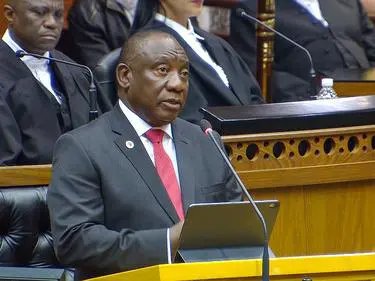South African President Cyril Ramaphosa, in his capacity as African Union (AU) chairperson, on Monday stressed the role of African countries in resolving African problems, including the COVID-19 pandemic.
In a statement marking the Africa Day, Ramaphosa said this event reminds Africans once again that "the solutions to Africa's problems, be they overcoming disease or eradicating poverty and underdevelopment, reside within Africa itself."
"Although the coronavirus pandemic is not an African problem alone, we have shown ourselves capable of agility and ingenuity," Ramaphosa said.
This year's Africa Day, the annual commemoration of the foundation of the Organization of African Unity, now known as the AU, was overshadowed by the wide spread of COVID-19 across the African continent.
It has been a little over three months since the first case of coronavirus on the continent was confirmed.
"This pandemic has been a stark reminder that regardless of whether we are born into wealth or indigence, we are all mortal, and can succumb to disease," Ramaphosa said.
As countries around the world battle to turn the tide against the pandemic, Africa has taken firm control of its destiny, by developing a clear strategy and raising financial resources from its member states, he said.
The African response to the coronavirus pandemic has received widespread praise. Despite the multitude of resource challenges they face, African countries have come together in remarkable ways, united by a common purpose, Ramaphosa said.
The countries of the Global South are more vulnerable to the impacts of COVID-19 because of low levels of development, insufficient resources and weak health systems, he said.
Although many African countries are ranking low on human development indices thus less capable to manage the fallout of a global health emergency of this kind on their own, "yet at the same time, some of the very health challenges African countries have wrestled with for decades have given us a clear understanding of what needs to be done, and how to do it," said Ramaphosa.
African countries have been able to use their experience in managing outbreaks of malaria, cholera, HIV, tuberculosis and hemorrhagic viruses like Ebola and Lassa.
"Our understanding of communicable diseases and how to manage them has put us in good stead when it comes to coronavirus," Ramaphosa said.
African governments have been swift and proactive in implementing measures to flatten the coronavirus curve, he said.
By early May, 43 African countries had full border closures, 53 had closed institutions of learning, 54 had limited public gatherings, 26 had instituted the compulsory use of face masks, 32 had instituted night-time curfews and 18 had imposed nation-wide lockdowns.
The AU has developed a comprehensive Joint Continental Strategy to guide cooperation among member states and set up a COVID-19 Response Fund.
A number of countries, including South Africa, have rolled out massive food relief and social assistance measures to support the vulnerable during this time.
African countries have scaled up their respective capacities for screening, testing and isolating. In April, the AU and the African Centers for Disease Control launched the Partnership to Accelerate COVID-19 Testing to strengthen testing capacity in vulnerable countries, with the aim of testing 10 million people over the next six months.
Through this partnership, warehousing and distribution hubs are being set up across the continent to distribute medical supplies with the aim of pooling the procurement of diagnostics and other medical commodities.
Although there have been severe shortcomings and constraints, such as the shortage of personal protective equipment, testing kits and ventilators, there have also been stories of excellence and intercontinental collaboration, Ramaphosa said.
"Although it is clear we will continue to rely on the support of the international community and international financial institutions to bolster the existing continental effort and build economic resilience, African countries are holding their own," Ramaphosa said.
The work being done to defeat the coronavirus is evidence of a continent determined to leverage its strengths and capabilities to resolve its own challenges, he said.
 简体中文
简体中文




